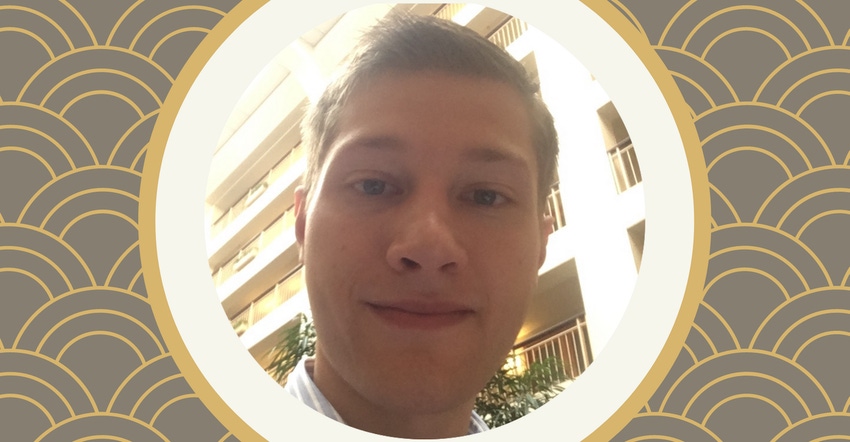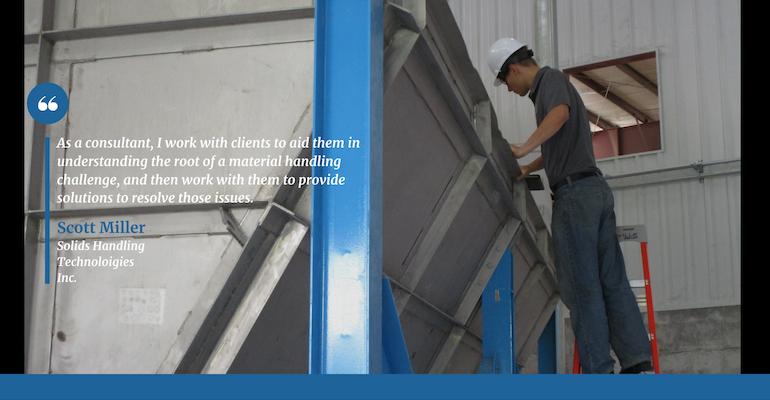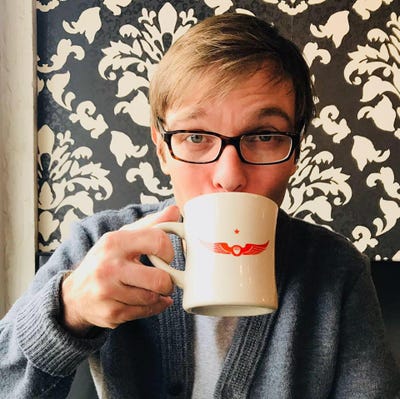Why I’m an Engineer: Scott Miller of Solids Handling Technologies
Miller discusses what it’s like to work as engineer and senior consultant in the powder and bulk solids industry.

Engineer Scott Miller joined the renowned bulk solids handling consulting firm Solids Handling Technologies Inc. in 2016 as a senior consultant. In his current role, he works with clients to provide expertise in bulk solids handling issues, evaluate existing solids flow problems, and recommend conceptual designs to address the concerns.
Prior to joining Solids Handling Technologies, Miller served as plant engineer at a small anthracitic waste CFB NUG operated by Westwood Generation LLC from 2014 to 2016 and applications engineer at Powerplant Technologies Incorporated from 2013 to 2014. He also worked for several years as a laborer with Powerplant Technologies. Miller earned a BS in Mechanical Engineering from Geneva College.
Powder & Bulk Solids recently asked Miller a few questions about his experiences and background as an engineer to provide insight on the various engineering roles within the powder and bulk solids industry.
What is the most rewarding part of working in the field as an engineer to you?
MILLER: Helping people solve material handling issues. As a consultant, I work with clients to aid them in understanding the root of a material handling challenge, and then work with them to provide solutions to resolve those issues. Often when bulk solids misbehave, they do so in ways that can be demoralizing, costly, and at times dangerous. I find being able to help people resolve these issues to be extremely rewarding.
What is the most challenging aspect of your job as an engineer?
MILLER: Keeping in mind that material flow is only a piece of a whole process or plant. In my role as a flow consultant, I am focused on one topic within a much larger array of important items. Using the science of bulk material handling, I help provide data to characterize a given bulk solids flowability and then based on that information determine how to reliable handle that material.
Often there is an ideal solution for how the material will flow best, but this is not always the most practical approach. As well the ideal flow solution might be far less than ideal when looking at other constraints. Other factors such as cost, time, structural requirements, environmental impacts, height and space constraints (to name only a few) will dictate what decisions are most appropriate.
My role as any engineering consultant is to recognize these other constraints are real and important. Then I must advise and make the end user aware of the implications of any design or decision from my specialized view and field of interest (bulk material handling).
I find the challenge to be that as a consultant I am not responsible for the balancing of these priorities, but I must remain aware that the end user has many other requirements and constraints at play. I must provide input to the end user which better informs their decision-making process and provide practical solutions to their material handling needs.

How did your educational experience(s) prepare you to work in the field?
MILLER: I attended a small college with an even smaller engineering program. This allowed for a very personalized level of interaction with the faculty there. I found this helpful as it gave me the chance to probe and learn from some fantastic professors. During my time at college, I was never the student who naturally synthesized a topic. It always took a lot of effort and study to really learn something well. During my summers I interned at a boilermaker company. Rather than being put in a back-office shuffling papers around, I had the opportunity to work in the field alongside the welders doing repair work inside of powerplants, and piping installations at chemical plants. I consider myself fortunate to have had this overlap of field experience and academic training. From this I continue to appreciate the dual teachers of both the textbook and first-hand experience.
Also, I would say that all this was only the start of my education. I still have so much to learn and continue to learn about the fascinating world of bulk solids.
If you could go back and do it again, what would you change about your engineering education?
MILLER: Anytime I look back on either my education or career thus far I often feel regret that I did not learn more and that it took me so long to learn what I now know. At the same time, I am always thankful for what I have learned and the many kind (and often far too patient) individuals who have taught me along the way. So perhaps both everything and nothing.
What’s the single most valuable lesson you have learned as an engineer – either in the classroom or in the field?
MILLER: Reality always has the final word. In engineering something is being analyzed or designed using some form of reductionism, this is necessary and important. It is vital to understand when an equation, a computer model, an analysis, or testing is used that we are employing a simplification of reality in some sense. This has imperfections and natural limitations. It does not necessarily invalidate the method, but it provides a framework to recognize that there are limitations and there are times when even the most rigorous testing and analysis will get things wrong.
As a result, a good sense of humility must be maintained to recognize both the limitations and ability for error. As well once the testing has been completed, the analysis performed, and the equations and models have been used; it is vital to carefully observe to see really happens, and how far the result and proceeding engineering might differ.
How do you think your engineering role will change over the next decade?
MILLER: I would be apprehensive to try and predict the future in any meaningful way. Instead, I will propose two of my hopes for myself in the coming decade. I have much to learn still. As a young engineer in my 20’s I hope to continue learning and growing in my knowledge of bulk solids with a growing body of experience to serve as my lens of understanding.
Secondly, I have had the great fortune to interact with some truly incredible and wise contributors to the field of bulk material handling. Again, and again, I have been struck by the rich kindness so many of them seem to exude. I hope to follow their lead and to become more graceful and kind in the coming decade. I hope to keep in mind that what is done in the world of bulk solids does intersect with the lives of human beings who matter and have intrinsic worth to them.
For more career development articles, click here.
About the Author(s)
You May Also Like




